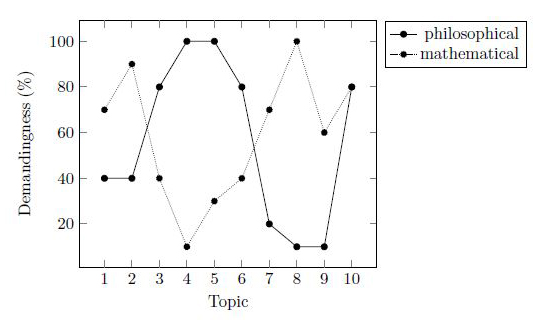Course Meeting Times
Lectures: 2 sessions / week, 1 hour / session
Recitation: 1 session / week, 1 hour / session
Prerequisites
There are no prerequisites for this class. In practice, however, people who do well tend to have some experience proving things, or have done a lot of math or computer science. If you’re a freshman, you might consider waiting a year before signing up.
Difficulty
Here are the levels of philosophical and mathematical demandingness of each of the topics we’ll discuss:

- On the philosophical side, a demandingness level of 100% means that some of the ideas we’ll be discussing are rather subtle; you won’t need philosophical training to understand them, but you’ll have to think about them very carefully.
- On the mathematical side, a demandingness level of 100% means that the lecture is designed for someone who is familiar with college-level mathematics or is otherwise experienced in mathematical proof.
Textbook
There is a required textbook, which you should use to supplement your understanding of the lectures and as an aid to completing problem sets:
Buy at MIT Press Rayo, Agustín. On the Brink of Paradox: Highlights from the Intersection of Philosophy and Mathematics. MIT Press, 2019. ISBN: 9780262039413. [Preview with Google Books]
For specific chapter information, see the Readings section.
Grading Policy
| ACTIVITIES | PERCENTAGES |
|---|---|
| Problem sets | 80% |
|
Pop quizzes and surveys During some lectures, there will be pop quizzes or surveys. A pop quiz consists of multiple choice questions on material discussed in the current or preceding lecture. You’ll have to answer a quiz correctly to get credit. A pop survey is a questionnaire aimed at figuring out where the group stands on some issue. All it takes to get full credit on a survey is to participate. Your final Pop Quiz and Survey grade is the result of averaging your pop quiz and survey scores across the semester, after dropping your lowest score. |
15% |
|
Recitation section attendance Attending recitation sections is mandatory. For each recitation meeting, you will be assigned a grade of 100% if you attend, or 0% if you fail to attend. (Tardiness may count as an absence, at your TA’s discretion.) Your lowest attendance grade will be dropped. |
5% |
For information on the problem sets, see the Assignments section.










